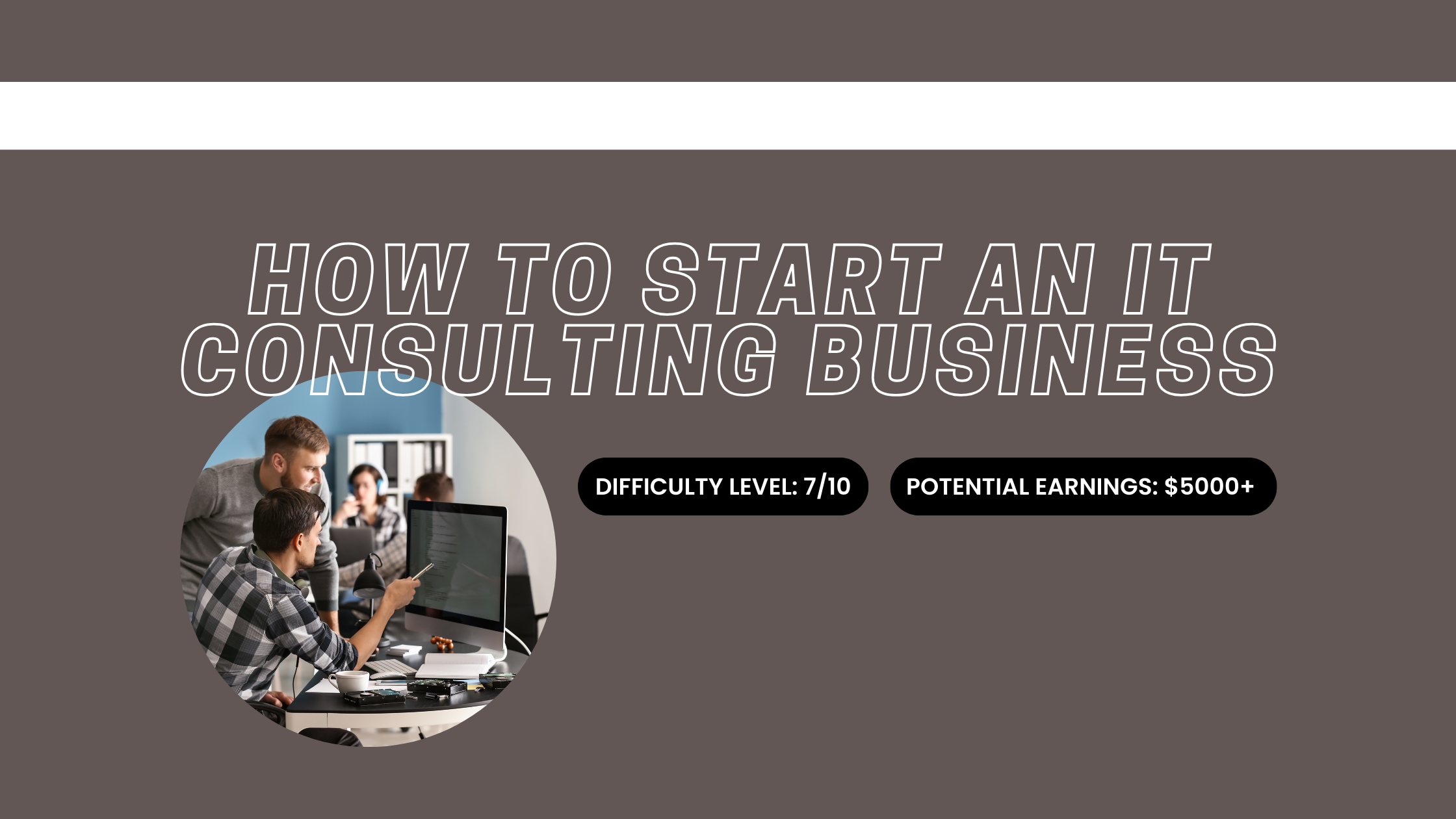How to Start an IT Consulting Business
Time & Money
Difficulty
7/10
Weekly Time Commitment
15-25 hours
Earnings Per Month
$5,000 - $15,000
Is Starting an IT Consulting Business The Right Gig for Me?
Starting an IT consulting business is ideal for individuals with a solid background in information technology and strong problem-solving abilities. It is a great side gig for people who can express complex ideas well, and who like to analyze and optimize systems to maximize their efficiency. You will also need to be comfortable working with multiple clients. This is a suitable business venture for tech savvy professionals who like project variety and working independently. But if you prefer structured work hours with predictable targets, or you're not a fan of client interaction and sales, then this is probably not the gig for you. The role demands persistence, flexibility and proactive networking.
Preparation: How to Start an IT Consulting Business
Before launching your IT consulting business, ensure you have a robust understanding of your specialty, whether it’s cybersecurity, cloud solutions, or software development. Obtain relevant certifications like CISSP, PMP or cloud provider accreditations to make you more credible. Research the market to understand its direction, and the market that you want to serve. Draft your service, pricing and marketing plan. Thirdly, create a professional website and LinkedIn profile that highlight your experience, expertise and services.
Execution
Define Your Niche and Services
First identify your IT specialty. Specializing in a service like network security, data management or software implementation can differentiate you from the crowd. Knowing your niche lets you target your marketing and services to the specific clients who need that expertise. Once you have defined this, outline service offerings so potential clients know what to expect from you.
Set Up Your Business Legally
Register your IT consulting business as a LLC or sole proprietorship and get any required licenses. Make sure that your personal assets are protected by the legal framework and that your business counts as a legitimate legal entity. This preparation covers your business against legal and financial risks, and though it might be tempting to skip these steps, you will pay for it down the line if you do.
Develop a Client-Friendly Website
Create a professional looking website with client testimonials, and create listings that describe your services & experience. SEO strategies should be applied on your site so potential clients searching for IT consultants can find you easily. Include a blog or resource section with relevant industry insights to show off your knowledge and rank better on Google. Well-designed websites are your virtual storefront, helping you build trust with potential clients who decide to research your background online.
Network and Establish Partnerships
Networking is essential to source clients and to build your brand's reputation. Take your name to industry conferences, local business meetups and online IT forums. Working with other professionals from adjacent industries like project managers or software developers can result in beneficial partnerships. Networking can bring new opportunities and referrals for your consulting business.
Create a Pricing Strategy
Decide on a pricing model that aligns with industry standards, whether it be hourly rates, project-based fees, or retainer agreements. Research competitor pricing in your niche to ensure you remain competitive while reflecting your value. Be clear and transparent with clients about your pricing and what it includes. Structured pricing helps potential clients understand your offerings and feel confident in their investment.
Implement a Client Onboarding Process
Develop a streamlined client onboarding process that includes an initial consultation to assess their needs, a proposal outlining the scope of work, and a contract that specifies deliverables and timelines. This step is crucial for setting clear expectations and building trust from the start. A smooth onboarding process makes clients feel valued and assures them that they are in capable hands.
Stay Updated with IT Trends
The IT field evolves rapidly, so staying current is essential to maintain a competitive edge. Regularly attend webinars, enroll in courses, and read industry publications to keep your knowledge fresh. This ongoing learning allows you to offer up-to-date solutions and maintain your status as an expert in your field. Clients appreciate consultants who are proactive in adapting to the latest technologies and best practices.
Bumps In The Road
Finding Your First Clients
Securing initial clients can be difficult, especially without an established reputation. To tackle this, leverage your network by reaching out to former colleagues and industry contacts. Offering discounted services or short-term engagements can help build a client base and gather testimonials. As you build experience and credibility, client acquisition will become easier through word-of-mouth and referrals.
Managing Client Expectations
Sometimes clients set unrealistic expectations or request services beyond the scope agreed upon. Defining deliverables and keeping communication open will help you manage this. Weekly or monthly progress reports and meetings can help keep projects on track and client expectations in line with reality. Always be transparent and proactive - this helps clients understand what can and can not be achieved within the project scope.
Balancing Multiple Projects
Managing multiple clients simultaneously can be overwhelming if not managed well. Use project management tools like Trello, Asana, or Monday.com to track tasks, deadlines and progress. Prioritize projects by deadline & complexity, and delegate tasks where appropriate. Workflow systems can help you maintain quality and prevent burnout while delivering consistently great service.
Conclusion
Starting an IT consulting business can be a highly rewarding and fulfilling business venture for a highly motivated individual. It comes with its fair share of challenges, but if you're able to persist through these, the rewards are great. Successful IT consultants often rake in a great salary, and much of the work can be done remotely. If you think that starting an IT consulting business might be the right gig for you, what are you waiting for? As long as you focus on delivering excellent results for your clients, with a smile on your face, you'll likely go far.
Continue Learning

Financial Coaching
Launch a financial coaching business by gaining certifications in personal finance, budgeting, and investment strategies to build credibility.

Career Coaching
Start a career coaching business by gaining relevant certifications in coaching, human resources, or career development to enhance your expertise.
